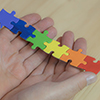More variables, more rejection?
DOI:
https://doi.org/10.18030/socio.hu.2021.2.3Keywords:
social attitudes towards gays and lesbians, prejudice, homophobia, adoption by same-sex parents, European Social SurveyAbstract
Our study examines social attitudes towards lesbians and gays, using data from the 8th and 9th rounds of the European Social Survey (ESS), focussing primarily on the following three variables: Gay men and lesbians should be free to live their own life as they wish – (where freedom of lifestyle is meant as being free and/or entitled to live as gays and lesbians) (B34); If a close family member was a gay man or a lesbian, I would feel ashamed (B35); Gay male and lesbian couples should have the same rights to adopt children as straight couples (B36).
Since 2002, for the first seven ESS rounds, the core module of the main questionnaires included only one general acceptance question (B34). However, it was increasingly difficult to measure manifestations of ‘modern homonegativity’ – especially in European societies characterized by relatively high levels of social inclusion – with only one variable. Introducing two additional variables (B35 and 36) to the ESS core module in the 8th round made it possible to construct a more complex and reliable picture of different dimensions of social attitudes towards gays and lesbians in Europe.
Our aim is to contribute to the European literature on the social acceptance of lesbian women and gay men by comparing all three variables (B34–35–36) not only on the basis of the usual socio-demographic variables (such as age, gender, education, religiosity etc.) used in previous empirical analyses but also by considering the institutionalized possibilities for adoption by same-sex couples in the 20 examined societies. Our empirical analyses are based on descriptive statistics and linear regression models, using data from 20 countries that took part in both the 8th and 9th ESS rounds.





